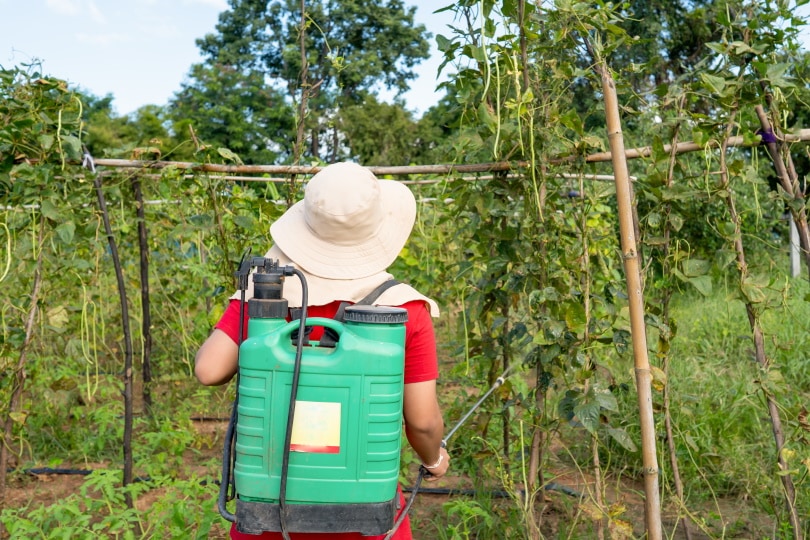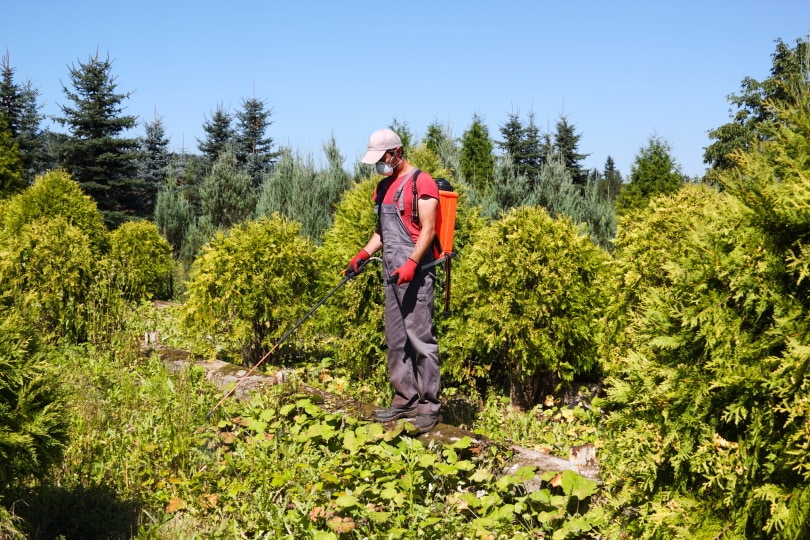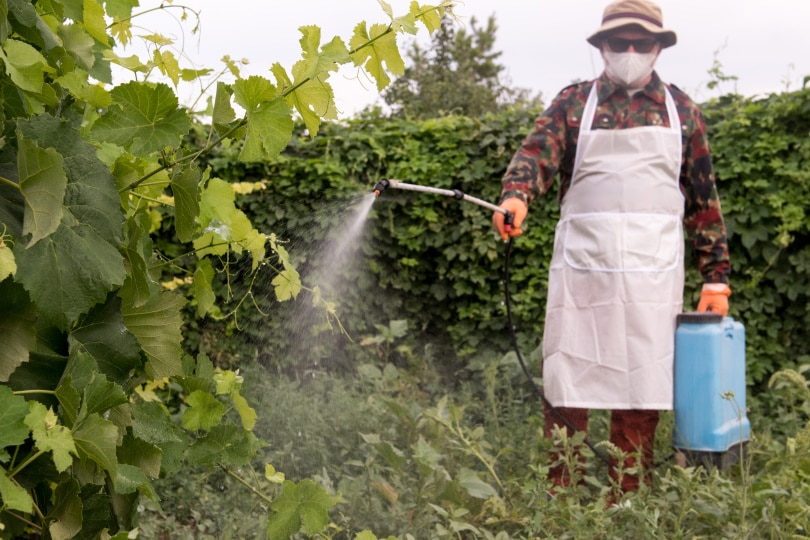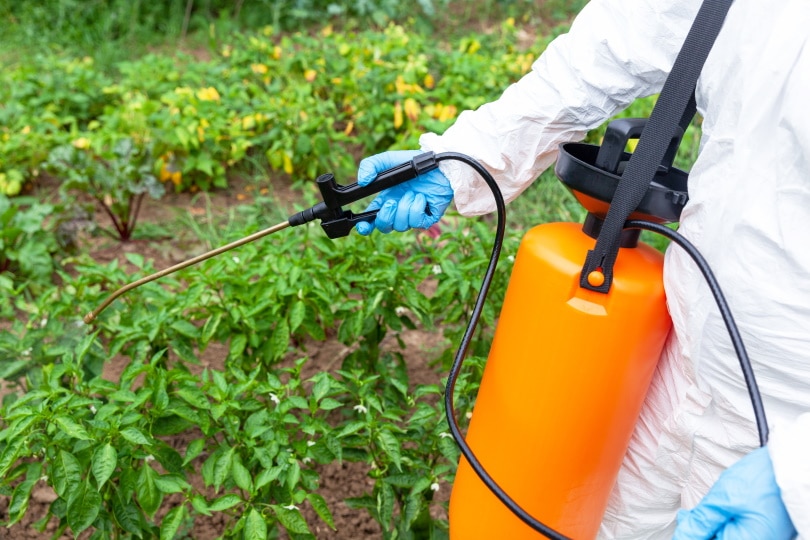What Kind of Weed Killer Is Safe for Vegetable Gardens? What You Need to Know
-
Pete Ortiz
- Last updated:

If you wish to grow a healthy and lush vegetable garden, you have to stop weeds from lurking in. The best way to do so is to use a weed killer. But what kind of weed killer is safe? Using chemicals on vegetables isn’t always safe, so knowing what weed killer is safe to use in your vegetable garden is vital.
We’ll tell you what the safest weed killer for your vegetable garden is in this article. Keep reading to learn more!
Safest Weed Killers for Vegetable Gardens
Weed killers ensure healthy vegetable growth by killing off weeds, which usually take away nutrients from vegetables.
Mulching, cultivation, and using a weed barrier are the safest ways of killing weeds. But you can use several safe and scientifically-approved weed killers, such as:
1. Glyphosate
Glyphosate is among the safest weed killers, especially for broadleaf weeds and grasses. It interferes with the weed’s production of amino acids.
It works best when applied to actively growing plants in late spring through summer, but it will also work in the fall. That’s when many perennial weeds move nutrients from their leaves to their roots.
Glyphosate is a non-selective herbicide. It means that it’ll kill any unwanted plant it touches when applied. It works by preventing plants from producing proteins necessary for growth.
RoundUp (the brand name for glyphosate) does not affect nearby plants. But, be careful when spraying any chemical near vegetables. It’s because even a little drift can do damage.
Wear rubber gloves and safety goggles when spraying this weed killer. Also, follow all package directions.
2. Pendimethalin

Pendimethalin is an effective pre-emergent herbicide. It kills weed seeds while they are in the soil, meaning that you apply it to the soil before weeds appear. It stops germinating seeds from sprouting and forming roots.
You can also apply it on established plants once they’re about six inches high. Pendimethalin is absorbed by plant foliage and roots.
It doesn’t move through the soil after application. It makes it safe for vegetables that are deeply rooted in the soil.
However, it is not effective against annual broadleaf weeds or perennials.
3. Corn Gluten Meal
Corn gluten meal (CGM) is a byproduct of corn milling high in protein. You can use it as a fertilizer and an additive in pet foods and livestock feed.
CGM is an organic pre-emergent herbicide. It kills broadleaf weeds, such as dandelions and clover. However, it doesn’t kill existing weeds or perennial weeds. But it stops their seeds from germinating.
This weed killer does not harm earthworms and other soil microorganisms. But it inhibits seed germination. So, don’t apply it before planting a new lawn, flower bed, or vegetable garden.
Spread corn gluten meal around vegetable seedlings before weeds germinate. After applying the weed killer, water thoroughly. It’ll incorporate the corn gluten meal into the soil. It keeps most weeds from sprouting for three to four weeks. So, you’ll need to reapply it if you want to control weeds all season long.
4. D-Limonene

D-limonene is a colorless liquid with a potent orange odor. It’s found in all citrus fruits, and you can use it as a flavoring agent in foods. In agriculture, it’s used as a pesticide and an insecticide. You can use it to kill fire ants and termites.
D-limonene kills weeds through contact absorption. When sprayed on broadleaf weeds, the compound penetrates the plant tissue. The membranes lose their ability to retain nutrients. It eventually causes the plant to die from starvation. You can apply it with a sprayer.
It also kills weeds by suffocating them. It breaks down the waxy layer on leaves that retains water, causing them to dry out.
It may take several applications of D-limonene to kill all the weeds growing in your vegetable garden but do not despair.
5. Dacthal (DCPA)
Dacthal weed killer is another effective herbicide safe for use in a vegetable garden. It is a pre-emergent herbicide, meaning it prevents the germination of weed seeds. So, apply it before the weed seeds have a chance to sprout.
It is a selective herbicide. You can use it to kill weeds around onions, cauliflower, turnips, broccoli, and cucumber.
It has low toxicity to humans. But you should wear gloves when applying because it can irritate your skin. It’s harmful to fish, and it can contaminate groundwater if applied near streams or rivers.
If you apply Dacthal too early in the season (before April), follow up with a second application of Dithiopyr in mid-July. It’ll keep broadleaf weeds from growing in your vegetable garden.
This weed killer is safe for use in vegetable gardens, provided you’re not growing broadleaf vegetables.
6. Sethoxydim

Sethoxydim is a selective herbicide that kills grasses but doesn’t harm broadleaf plants. It’s an ingredient in Poast, Select, Vantage, and many other products.
You must apply Sethoxydim to actively growing weeds only. It can be challenging to predict because weeds go through growth spurts at different times of the year. It depends on your climate region.
Sethoxydim is a post-emergent herbicide that works by inhibiting photosynthesis. It has no residual activity and will not move through the soil. It does not affect plant growth. But it’ll cause severe injury or death to susceptible plants. The effects of this herbicide are fast. It means you should see results within hours.
You can apply Sethoxydim as a foliar spray or with ground equipment. The label specifies that it is only effective on weeds such as crabgrass, goosegrass, barnyard grass, and annual bluegrass.
7. Herbicidal Soaps
Herbicidal soaps are a safe alternative to most herbicides. It’s because they’re made from natural ingredients. They break down fast into harmless substances.
These products work by burning plant tissue. They need several applications for days to kill weeds completely. They are non-selective, meaning they’ll kill any plant they come into contact with. But it only affects the plant’s surface and breaks down fast. So, it’s considered safe for use in vegetable gardens.
To avoid damaging your vegetables, spray the herbicidal soap on a warm day when there’s no wind.
8. Trifluralin

Trifluralin is a selective weed killer. It’s safe to use on vegetables, flowers, and fruits. It works well in preventing the growth of weeds. But it doesn’t kill existing weeds.
Spray it before planting your vegetables. Trifluralin is available in liquid form. Also, it comes with a sprayer that you can use in spreading it in the garden.
You can use it on vegetable gardens to prevent grassy and broad-leaved weeds from growing. It doesn’t have any adverse effects on garden crops as long as you follow instructions.
But, it’s best to avoid using this herbicide when the soil temperature starts to get warmer than 65 degrees Fahrenheit (18 degrees Celsius). Use the product according to instructions to ensure maximum results.
9. Acetic Acid Products
Apply it on a sunny day when no rain is expected for 24 hours. It’s because moisture will dilute the solution and reduce its effectiveness. A windless day is also ideal because the wind can also dilute the solution and carry it to other plants.
For maximum effectiveness, use distilled white vinegar with a 5% concentration of acetic acid. Some types of vinegar have lower acidity and are less effective at killing weeds.
10. Natural Oil Products

Natural oil products, such as Weed Zap and Orange Guard, are broad-spectrum contact herbicides that kill weeds on contact. They work by breaking down the waxy surface of the plant, causing it to dehydrate.
Natural oils have low toxicity to humans, birds, and bees. Some are even labeled for use in vegetable gardens. Weed Zap, for instance, contains several natural ingredients, including clove oil and citric acid. It’s safe for vegetable gardens. It is also safe for pets and children, and you don’t need to wear protective clothing when using it.
Types of Weed Killers
- Post-Emergent Herbicides: These are weed killers you can use to kill weeds after they have emerged from the ground. You can use them to destroy weeds after their stem and leaves have developed.
- Pre-Emergent Herbicides: They kill weed seedlings before they have emerged from the ground. Pre-emergent herbicides contain chemicals that prevent weed seeds from germinating in the soil.
- Selective Herbicides: They kill specific weeds, but not the whole lawn or garden. The active ingredients in selective herbicides target broadleaf plants, leaving the vegetables unharmed.
- Non-Selective Herbicides: These types of weed killers will destroy any vegetation it comes in contact with, including trees, shrubs, and vegetables.
- Contact Herbicides: They’re also called “burn-down” herbicides. They kill the weeds on contact. Using a contact herbicide is appropriate if you have many annual weeds such as chickweed, crabgrass, and foxtail, to control.
- See Also: 7 Ways to Get Rid of Weeds in Your Lawn
Final Thoughts
If you want to avoid using harmful weed killers in your garden, you can opt for any of the weed killers mentioned above. The safest weed killer on this list is glyphosate, and it controls many types of grass in your vegetable garden.
Another effective method is mulching around your vegetables. This way, weeds will not grow underneath.
We hope you’ve found this information helpful in your quest to learn which weed killers are the safest for your vegetable garden. When used well, they will rid your garden of weeds.
Featured Image Credit: Budimir Jevtic, Shutterstock
Contents


